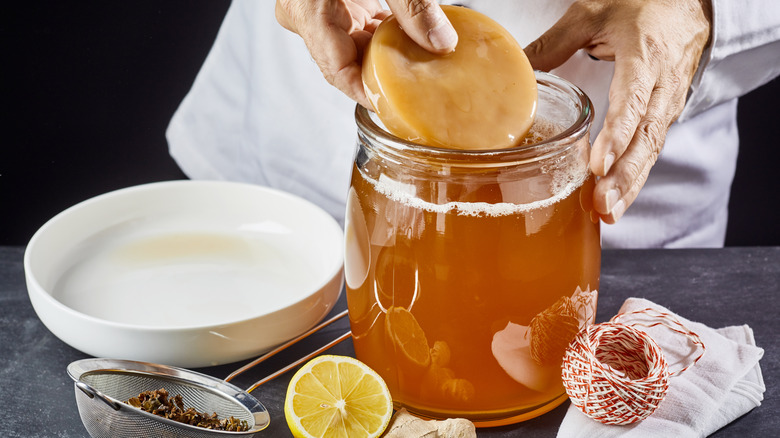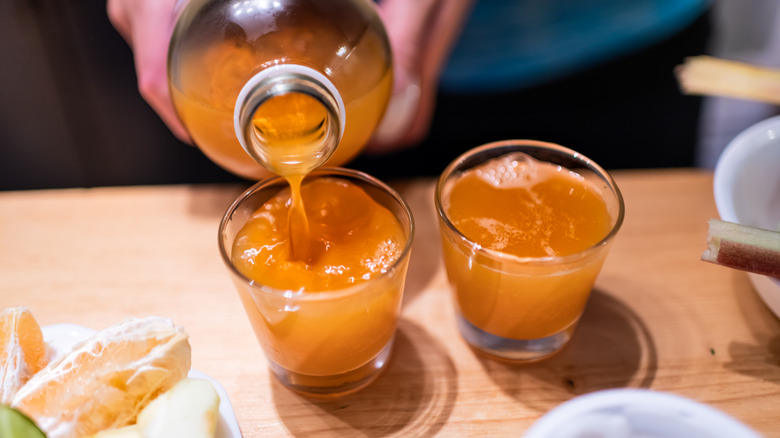Here's How Long Kombucha Will Last After You Open It
While kombucha may once have been virtually unknown outside of East Asia, these days you can find it in just about any grocery store, typically sold in 16-ounce, as well as 2-liter size bottles. A 16-ouncer is easy enough to finish in an afternoon, but unless you're shopping for a party, a 2-liter bottle is probably going to take you a few days, at least. Which of course begs the question, once you open a bottle, how long is it good for?
It's totally understandable to be a little confused here — on one hand, kombucha is a fermented drink, and fermented drinks generally don't spoil. But on the other hand, many popular brands of kombucha have some amount of real fruit juice in them, which certainly can go bad.
The good news is that kombucha can only go bad in a handful of cases, which we'll get into. The main thing that'll happen is the kombucha will lose its carbonation, which is a negative for most kombucha drinkers who presumably enjoy the light effervescence. For optimal taste, it's generally advised to finish a bottle within a week of opening it.
SCOBY-Doo, where are you?
Kombucha, as you may be aware, is a drink made from fermented black tea and often flavored with fruit and herbs. It's made by introducing a culture of bacteria, called a SCOBY (symbiotic culture of bacteria and yeast), to the sweetened tea, wherein fermentation takes place as the bacteria consume the sugars. This makes the drink tart and produces CO2 as a byproduct, which makes the drink fizzy. Some amount of alcohol is created as well, although it generally stays under .5% ABV (think about one-tenth of a beer), except in the case of hard kombucha, which is intentionally made to be more alcoholic.
If you store kombucha outside of the refrigerator, it may continue fermenting — but don't expect it to turn into a boozy delight. It can quickly turn to vinegar, which isn't unsafe to drink, but definitely isn't as pleasant. Unless there was contamination in the commercial brewing and bottling process, a sealed bottle of kombucha isn't going to spoil, whether you keep it in the fridge or not. When the bottle is opened (and especially if you put your mouth on it), however, it's exposed to the environment, which can introduce problems.
It's been one week since you opened me
When kombucha is opened, a few things start to happen immediately: The carbonation escapes, the nutrients and flavor begin to degrade, and outside bacteria are introduced. That bacteria, unlike the kinds already present in kombucha, can cause spoilage — and that's extra true if you drink directly from the bottle, introducing the drink to bacteria from your own mouth. Chances of contamination are much higher for homebrewed kombucha, so if you're making your own, look out for signs of spoilage.
Also, know that the opened kombucha must be refrigerated — bacteria are better able to multiply at higher temperatures, and higher temperatures will also damage the good bacteria, reducing the drink's probiotic effects. But at the very least, kombucha that's been sitting out in the heat just won't taste as good.
When drinking kombucha (or, really, when consuming anything) trust your gut if it smells or tastes off. Rotten egg smells and exceedingly sour (not just pleasantly tart) flavors may arise in kombucha that's turned. And if you see mold — not to be confused with the SCOBY, which can leave brownish globs floating in the drink — toss it.
Chances are, an opened kombucha won't make you sick after ten or so days in the fridge, but it'll probably be flat and less flavorful. Still, in the interest of safety, don't risk it — drink your kombucha within a week of opening it, or spill it out.


